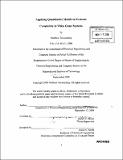Applying quantitative models to evaluate complexity in video game systems
Author(s)
Tanwanteng, Matthew (Matthew E.)
DownloadFull printable version (5.254Mb)
Other Contributors
Massachusetts Institute of Technology. Dept. of Electrical Engineering and Computer Science.
Advisor
Robert C. Miller.
Terms of use
Metadata
Show full item recordAbstract
This thesis proposes a games evaluation model that reports significant statistics about the complexity of a game's various systems. Quantitative complexity measurements allow designers to make accurate decisions about how to manage challenge, keeping in mind the player's physical and mental resources and the amount/type of actions the game requires players to act upon. Managing the operational challenge is critical to keeping players in a state of enjoyment, the primary purpose of video games. This thesis first investigates the relationship between enjoyment and complexity through the concept of Flow. From there it examines the properties of GOMS that are useful to analyzing videogames using Tetris as a case study, and then it examines and dissects the shortcomings of a direct usability approach and offers solutions based on a strategy game example. A third case study of the idle worker scenario in strategy games is detailed to further corroborate the usefulness of applying a GOMS based analysis to videogames. Using quantitative measurements of complexity, future research can aggressively tackle difficulty and challenge precisely, mitigate complexity to widen market appeal, and even reveal new genre possibilities.
Description
Thesis (M. Eng.)--Massachusetts Institute of Technology, Dept. of Electrical Engineering and Computer Science, February 2009. Cataloged from PDF version of thesis. Includes bibliographical references (p. 41).
Date issued
2009Department
Massachusetts Institute of Technology. Department of Electrical Engineering and Computer SciencePublisher
Massachusetts Institute of Technology
Keywords
Electrical Engineering and Computer Science.